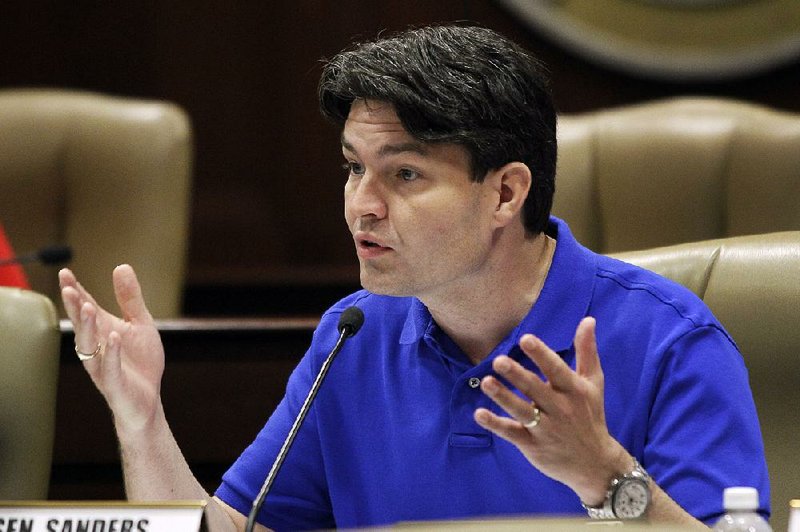A legislative committee on Wednesday endorsed a fee that a state agency has said it will begin collecting as soon as Dec. 1 from companies that offer plans on the state's health insurance exchange.
Also on Wednesday, the Department of Human Services released a copy of a tentative agreement under which Arkansas Health Insurance Marketplace would operate a program offering Medicaid subsidies for employer-sponsored insurance as part of the Arkansas Works law passed by the Legislature this year.
Under the agreement, the department would begin paying the Health Insurance Marketplace next month to develop the program, with the payments totaling up to $2.9 million through July.
Both the fee, equal to 3 percent of the premiums for plans sold on the exchange, and the contract with the Human Services Department will provide sources of revenue for the Health Insurance Marketplace in 2017, when the agency will no longer be able to spend money from a $99.9 million grant on operations.
The Health Insurance Marketplace notified insurance companies in an Aug. 19 letter that it will begin collecting the fee on Dec. 1 as it takes over responsibility for approving plans sold on the exchanges and helping consumers enroll.
A spokesman for agency said last week that it had the authority to collect the fee, even though the fee was not set by the Legislature. Act 1500 of 2013, which created the agency, says the Legislature "shall establish a reasonable initial assessment or user fee and reasonable increases or decreases in the amount of future assessments."
Sen. David Sanders, R-Little Rock, chairman of the Arkansas Health Insurance Marketplace Legislative Oversight Committee, said he doesn't expect the Health Insurance Marketplace to begin collecting the fee until the Legislature meets in January and can clarify the procedure for establishing the fee.
The fee would replace a 3.5 percent fee that has been collected by the U.S. Department of Health and Human Services' Centers for Medicare and Medicaid Services since enrollment on the federal exchanges began in 2014.
"My concern is, it's great when it goes down [to] 3 percent," but if it needs to be raised at some point, lawmakers are going to want to have a say, Rep. Stephen Magie, D-Conway, the committee's other chairman, said during the oversight committee's meeting Wednesday.
Half the fee would go to the federal government to allow the state to continue using the federal enrollment system, including healthcare.gov, for individual consumers.
The rest, an estimated $10.7 million annually, would go to the Health Insurance Marketplace.
The exchange fees are paid by consumers, through monthly premiums, and the federal government, which subsidizes the premiums.
In support of the Health Insurance Marketplace's authority to collect the fee, Health Insurance Marketplace spokesman Alicia McCoy last week cited a vote by her agency's board on Sept. 30 to recommend the 3 percent fee as well as a pair of letters from the chairmen of the legislative oversight committee to the leaders of the Senate and House.
Those letters, dated Dec. 11, claimed that the committee had endorsed the board's recommendation at a meeting on Oct. 22, even though the committee did not take any action on the recommendation during the meeting.
Bureau of Legislative Research Director Marty Garrity said last week that the bureau's staff drafted the letter and was responsible for the error.
Matthew Miller, an attorney with the bureau, told legislative oversight committee members Wednesday that Act 1500 is unclear as to whether the full Legislature needs to approve the fee.
He noted that the law requires the Health Insurance Marketplace's board and the legislative oversight committee to make recommendations.
"Typically persons who are given duties like that are charged with interpreting the scope of that duty," he said.
The question is whether the Health Insurance Marketplace's interpretation of the law is "clearly erroneous or clearly defying the statute," he said.
With no committee members objecting, Sanders declared the recommended fee "reviewed." The committee then unanimously voted to endorse the board's recommendation.
Sen. Jason Rapert, R-Bigelow, said he was concerned about the Arkansas Works contract because legislators were told when they created the Health Insurance Marketplace that it would not be supported by state tax dollars.
"If your operation is dependent upon you getting this arrangement, which is going to be state tax dollars, that's a whole different matter from you just [getting] an opportunity to provide a service," Rapert said.
Gov. Asa Hutchinson has proposed Arkansas Works as a way of continuing to provide Medicaid coverage beyond the end of the year to adults with incomes of up to 138 percent of the federal poverty level as authorized under the Affordable Care Act.
Most of that coverage is presently provided through private plans offered on the exchange for individual consumers, with the Medicaid program paying the premium and providing additional subsidies to reduce or eliminate any required out-of-pocket spending by the enrollee for medical care.
Arkansas Works, which is awaiting federal approval, would add changes that Hutchinson has said would encourage enrollees to stay employed and take responsibility for their health care.
That includes covering some enrollees through subsidized job-based coverage.
Under the agreement between the Human Services Department and Health Insurance Marketplace, the marketplace would verify the eligibility of employers and employees and help them enroll, dispense the Medicaid subsidies to employers, operate a call center to answer questions from employers and employees, and establish an Internet portal for employers and employees.
The agreement, which has already been signed by Health Insurance Marketplace Director Cheryl Gardner and Human Services Department Director Cindy Gillespie, also says the Human Services Department may direct the Health Insurance Marketplace to market the program to insurance agents.
Gardner said she will present the agreement to her agency's board for its approval next week.
Because of the small-business exchange, which covers about 300 employees from about 60 businesses, Gardner said her staff already knows small employers and insurance brokers and has experience working with small group insurance.
"Even the optics of DHS all of a sudden going out to small businesses and saying, let us do your insurance, it frankly didn't make sense because DHS has always done Medicaid," Gardner said.
The contract isn't essential to her agency's financial sustainability, she said.
Hutchinson spokesman J.R. Davis said in a statement that the money is "not a subsidy to the marketplace."
"DHS could have procured stand-alone technology and consulting, but the alternative allows DHS to use functionality and technology already in place in Arkansas," he said.
A Section on 09/15/2016

